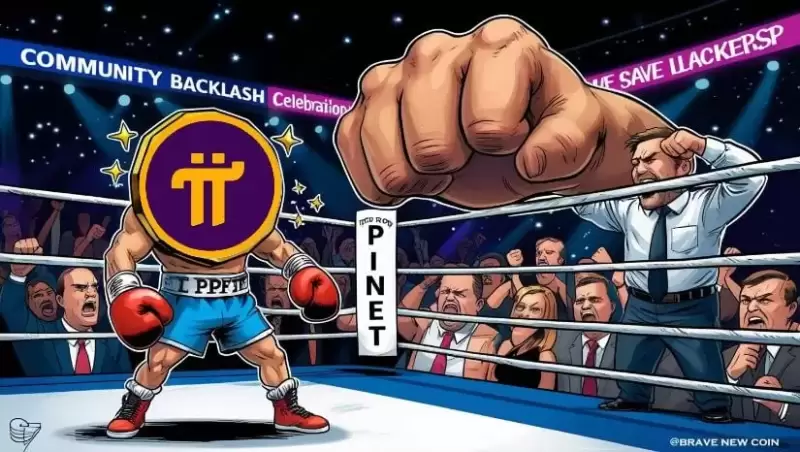 |
|
 |
|
 |
|
 |
|
 |
|
 |
|
 |
|
 |
|
 |
|
 |
|
 |
|
 |
|
 |
|
 |
|
 |
|
传统金融长期以来一直在失败,但其裂缝却始终被忽视。在当前的经济挑战下,这些裂缝

Traditional finance has been failing for a long time, but its cracks have always been ignored. Under the current economic challenges, these cracks are finally showing up, and the shortcomings of the traditional financial system can no longer be overlooked. Nearly 1.4 billion people today remain unbanked. Around one-fourth of the global population is left behind by an industry that thrives on exclusion and inefficiency.
传统金融长期以来一直在失败,但其裂缝却始终被忽视。在当前的经济挑战下,这些裂缝终于显现出来,传统金融体系的弊端已经不容忽视。如今,仍有近 14 亿人没有银行账户。全球约四分之一的人口被一个因排斥和低效率而蓬勃发展的行业抛在了后面。
With their outdated models, traditional financial institutions continue to exclude those who lack access to documentation, credit histories, or stable infrastructure. This model works against a certain class of population, and there have been no notable changes over the years to increase inclusion. However, blockchain and the new generation of neobanks might have the answer to financial inclusivity in this new age of digital finance.
由于模式过时,传统金融机构继续将那些无法获得文件、信用记录或稳定基础设施的人排除在外。这种模式针对的是某一类人群,多年来并没有发生显着的变化来增加包容性。然而,区块链和新一代新银行可能会在数字金融新时代找到金融包容性的答案。
Even beyond inclusivity, traditional financial systems have outdated processes that are proving unmanageable in today’s fast-paced digital era. Consider international money transfers—banks still require days to finalize cross-border transactions, and they add hefty fees to them as well. Remittance charges can soar up to an average of 6.35%, which is significant when you consider the value of currencies in developing nations.
除了包容性之外,传统金融体系的流程也已经过时,在当今快节奏的数字时代,事实证明这些流程难以管理。考虑一下国际汇款——银行仍然需要数天时间才能完成跨境交易,而且还增加了高额费用。汇款费用平均可飙升至 6.35%,考虑到发展中国家的货币价值,这一数字相当可观。
Neobanks built on blockchain infrastructure are changing this. Such platforms eliminate the need for middlemen, so transfers are faster, seamless, low-cost, and almost real-time. The use of decentralized networks removes the friction imposed by traditional banks, creating a financial system that serves everyone—not just the privileged few.
基于区块链基础设施的新银行正在改变这一现状。此类平台消除了对中间商的需求,因此转账速度更快、无缝、低成本且几乎实时。去中心化网络的使用消除了传统银行施加的摩擦,创建了一个为所有人服务的金融体系,而不仅仅是少数特权阶层。
The issue of financial inclusion is not new—it’s been a buzzword in the industry for years. Banks have been constantly scrutinized for overcomplicating onboarding processes and making key financial services inaccessible to socially struggling individuals. The majority of the unbanked population in the world lives in developing regions where financial institutions either don’t operate or have imposed insurmountable barriers to entry. The focus on documentation and credit history has shut out large populations, creating an unequal and unjust global financial system.
普惠金融问题并不新鲜——多年来它一直是业内的流行词。银行因入职流程过于复杂以及使社会困难个人无法获得关键金融服务而不断受到审查。世界上大多数没有银行账户的人口生活在发展中地区,这些地区的金融机构要么不运营,要么设置了难以逾越的准入障碍。对文件和信用记录的关注已经将大量人口拒之门外,造成了不平等和不公正的全球金融体系。
Neobanks are challenging this by moving beyond paper-based identification and adopting decentralized models. Technologies like behavior-based identification models through the blockchain—which we are also leveraging at WeFi—can make banking accessible to those who would otherwise be locked out. These next-gen systems can help provide financial identities to users who have been left behind by traditional banks and give them access to equal financial opportunities.
新银行正在通过超越纸质身份识别并采用去中心化模式来挑战这一点。通过区块链的基于行为的识别模型等技术(我们也在 WeFi 中利用了这些技术)可以让那些原本会被拒之门外的人可以使用银行服务。这些下一代系统可以帮助为被传统银行抛在后面的用户提供金融身份,并让他们获得平等的金融机会。
When you deposit your funds to a bank, the general expectation is that it’s safe. You expect your funds to just sit in your account—untouched and free from financial issues. This is an illusion created by traditional financial institutes. Banks have complete access to your funds, and they will use them for lending, investment, and other purposes. Most banks operate under fractional reserve banking models, a highly vulnerable system. In case of too many withdrawal requests in a short period, these banks are prone to collapse. We’ve seen several cases like this during the Covid-19 pandemic. So, the perception that you have full control over the funds in your bank account is a mere illusion.
当您将资金存入银行时,人们普遍期望资金是安全的。您希望您的资金只是留在您的帐户中——不受影响且不存在财务问题。这是传统金融机构制造的错觉。银行可以完全使用您的资金,并将其用于贷款、投资和其他目的。大多数银行在部分准备金银行模式下运营,这是一个非常脆弱的系统。如果短时间内提款请求过多,这些银行很容易倒闭。在 Covid-19 大流行期间,我们已经见过几起类似的案例。因此,认为您可以完全控制银行账户资金的想法只是一种幻想。
Neobanks are a great solution to this issue, especially platforms that offer non-custodial accounts. Users can retain full ownership and control over their assets, and the bank or any third party will not have any rehypothecation over them. This kind of autonomy is critical for financial resilience, especially in times of economic uncertainty.
Neobanks 是解决这个问题的一个很好的解决方案,特别是提供非托管账户的平台。用户可以保留对其资产的完全所有权和控制权,银行或任何第三方不会对其进行任何再抵押。这种自主权对于财务弹性至关重要,尤其是在经济不确定时期。
Another major shortcoming of traditional finance is its approach to data. Centralized systems accumulate vast amounts of personal information from customers, creating honeypots for cybercriminals. The finance industry is a prime target for data breaches, with the sector accounting for 27% of all data breaches in 2023 alone. These centralized systems make individuals vulnerable to identity theft, fraud, and other forms of cybercrime, with little accountability on the part of financial institutions.
传统金融的另一个主要缺点是其处理数据的方式。集中式系统积累了大量客户的个人信息,为网络犯罪分子创建了蜜罐。金融行业是数据泄露的主要目标,仅 2023 年,该行业就占所有数据泄露事件的 27%。这些中心化系统使个人容易遭受身份盗窃、欺诈和其他形式的网络犯罪,而金融机构却几乎不承担任何责任。
Blockchain-based neobanks remove this vulnerability by decentralizing data. In this model, individuals retain control over their personal information, and data breaches become less likely due to the transparent and secure nature of the blockchain.
基于区块链的新银行通过分散数据消除了这一漏洞。在这种模型中,个人保留对其个人信息的控制权,并且由于区块链的透明和安全性质,数据泄露的可能性变得较小。
Whenever a user hears about neobanks or blockchains, the first thought that pops up is ‘crypto is volatile’—its wild price fluctuations are a major worry for the mass population.Stablecoins provide a solution, offering the stability of traditional currencies while maintaining the speed, transparency, and security of blockchain technology. They create a way for users to avoid the risks associated with volatile assets, ensuring that their financial transactions remain stable and predictable.
每当用户听到新银行或区块链时,第一个想到的就是“加密货币波动很大”——其剧烈的价格波动是大众的主要担忧。稳定币提供了一个解决方案,提供了传统货币的稳定性,同时保持了速度区块链技术的透明度和安全性。它们为用户创造了一种避免与波动性资产相关的风险的方法,确保他们的金融交易保持稳定和可预测。
The future of finance will inevitably revolve around stablecoins, as they offer a clear path to financial inclusion without exposing users to the high-risk nature of the broader cryptocurrency market. These digital assets make financial services accessible, transparent, and reliable for anyone, anywhere.
金融的未来将不可避免地围绕稳定币展开,因为它们提供了一条明确的金融包容性路径,而不会让用户面临更广泛的加密货币市场的高风险。这些数字资产使任何人、任何地方都可以获取、透明且可靠的金融服务。
The cracks in traditional finance are deepening. For too long, banks have held control over money and dictated who can participate in the financial system. It resulted in billions of people being left behind, either because they lack documentation, live in
传统金融的裂痕正在加深。长期以来,银行一直控制着货币,并规定了谁可以参与金融体系。这导致数十亿人被抛在后面,要么因为他们缺乏证件,要么因为居住在
免责声明:info@kdj.com
所提供的信息并非交易建议。根据本文提供的信息进行的任何投资,kdj.com不承担任何责任。加密货币具有高波动性,强烈建议您深入研究后,谨慎投资!
如您认为本网站上使用的内容侵犯了您的版权,请立即联系我们(info@kdj.com),我们将及时删除。
-

-

-

- 越过高原:现在的动力在哪里
- 2025-04-03 12:15:13
- Chainlink和Vechain都在加密空间中建立了坚实的声誉
-

-

- 随着投资者要求领导更改,PI网络(PI)的价格下跌20%
- 2025-04-03 12:10:13
- Pi Coin的交易量也暴跌,反映了投资者的信心。尽管PI Core团队宣布了高级,但令牌的下降仍在继续
-

-

- 诸如官方特朗普和邦克(Bonk)等模因驱动的令牌失去了动力
- 2025-04-03 12:05:13
- 诸如官方特朗普和邦克(Bonk)等模因驱动的令牌最近引起了很多关注,因为它们的能力传播
-

- Vaneck推出了与Celestia(TIA)区块链相关的新金融产品
- 2025-04-03 12:05:13
- Vaneck推出了与Celestia相关的新金融产品,这是一个旨在提高可扩展性和数据可用性的区块链。
-

- 冷软件(冷) - 加密的未来?
- 2025-04-03 12:00:12
- 在不断发展的加密货币世界中,投资者一直在寻找新的创新项目,这些项目提供真正的实用性



























































